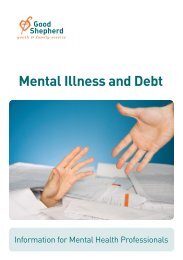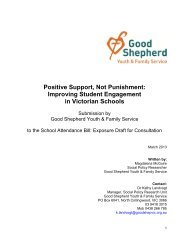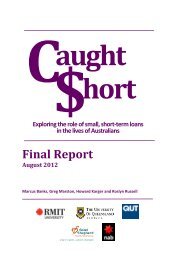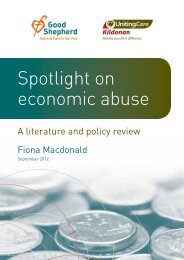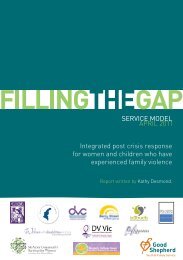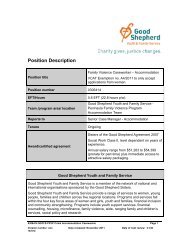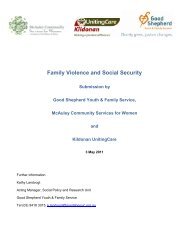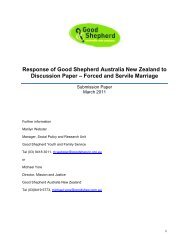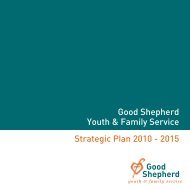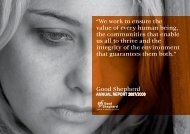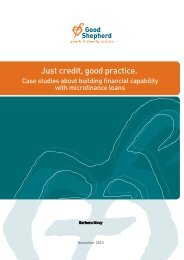Spotlight on economic abuse - Good Shepherd Youth & Family ...
Spotlight on economic abuse - Good Shepherd Youth & Family ...
Spotlight on economic abuse - Good Shepherd Youth & Family ...
You also want an ePaper? Increase the reach of your titles
YUMPU automatically turns print PDFs into web optimized ePapers that Google loves.
provide guidance materials for superannuati<strong>on</strong> fund trustees—who make the decisi<strong>on</strong><br />
whether to release funds or not—which include reference to family violence and informati<strong>on</strong><br />
about family violence dynamics and impacts (ALRC 2011c, p. 630).<br />
Victims’ compensati<strong>on</strong><br />
The recent ALRC/NSWLRC report into a nati<strong>on</strong>al legal resp<strong>on</strong>se to family violence argued<br />
that “victims’ compensati<strong>on</strong> is inextricably c<strong>on</strong>nected with an assessment of how legal<br />
frameworks can be improved to assist victims of family violence to navigate various<br />
jurisdicti<strong>on</strong>s” (2010, p. 156). Victims’ compensati<strong>on</strong> schemes, which are available in all<br />
states and territories, appear to be under-utilised by women as a source of financial support<br />
following domestic and family violence. It has been suggested by researchers and legal<br />
bodies that this may be due in part to a lack of knowledge of the schemes while there are<br />
also particular barriers related to the nature of victims’ compensati<strong>on</strong> legislati<strong>on</strong> including<br />
that there is inadequate recogniti<strong>on</strong> of the nature and dynamics of family violence<br />
(ALRC/NSWLRC 2010; Barrett Meyering 2010). Limitati<strong>on</strong>s relate to the linking of<br />
compensati<strong>on</strong> to specific criminal acts of violence and to criminal injuries, meaning that acts<br />
of family violence may not be recognised as criminal. Further each discrete ‘incident’ and<br />
‘injury’ must be proved which does not recognise the patterns of <strong>abuse</strong> that typically<br />
c<strong>on</strong>stitute family violence; generally, definiti<strong>on</strong>s of ‘injury’ also emphasise physical injury<br />
(ALRC/NSWLRC 2010). These limitati<strong>on</strong>s have been addressed in some jurisdicti<strong>on</strong>s (New<br />
South Wales and Northern Territory) where victims’ compensati<strong>on</strong> legislati<strong>on</strong> defines<br />
domestic violence as a specific injury and in Victoria where awards can be granted in<br />
respect of “significant adverse impacts”. The ALRC/NSWLRC report recommended that<br />
victims’ compensati<strong>on</strong> legislati<strong>on</strong> should: (a) provide that evidence of a pattern of<br />
family violence may be c<strong>on</strong>sidered in assessing whether an act of violence or injury<br />
occurred; (b) define family violence as a specific act of violence or injury … or (c)<br />
extend the definiti<strong>on</strong> of injury to include other significant adverse impacts<br />
(ALRC/NSWLRC 2010, p. 1393).<br />
Migrati<strong>on</strong> Law<br />
The ALRC (2011c) has recently made some recommendati<strong>on</strong>s for law reform which go<br />
some way to addressing c<strong>on</strong>cerns about the particular vulnerability to coerci<strong>on</strong> and c<strong>on</strong>trol of<br />
women experiencing family violence whose migrati<strong>on</strong> status is uncertain.<br />
As the law stands there is a family violence excepti<strong>on</strong> whereby permanent residence can be<br />
granted—despite relati<strong>on</strong>ship breakdown—to people <strong>on</strong> spousal or partner visas who are in<br />
Australia <strong>on</strong> the basis of their spouse or defacto relati<strong>on</strong>ship with an Australian citizen or<br />
permanent resident and who experience family violence. The ALRC (2011c) recommended<br />
changes to the Comm<strong>on</strong>wealth Migrati<strong>on</strong> Regulati<strong>on</strong>s 1994 to make the assessment of<br />
family violence under migrati<strong>on</strong> law simpler by allowing family violence victims to draw <strong>on</strong> a<br />
wider range of evidence and the Minister for Immigrati<strong>on</strong> and Citizenship has very recently<br />
announced these changes will be made (Bowen 2012, media release 17 June, viewed 25<br />
July at ).<br />
The Australian Government has not yet resp<strong>on</strong>ded to other ALRC recommendati<strong>on</strong>s<br />
although the Minister’s announcement did include that the proposed change is a “preliminary<br />
resp<strong>on</strong>se” to the issues raised by the ALRC. Other ALRC recommendati<strong>on</strong>s for changes to<br />
migrati<strong>on</strong> law were for: the family violence excepti<strong>on</strong> to be extended to people who have<br />
entered Australia for the purpose of marrying an Australian sp<strong>on</strong>sor and are <strong>on</strong> a<br />
Prospective Marriage visa but who experience family violence and do not marry the sp<strong>on</strong>sor;<br />
43



